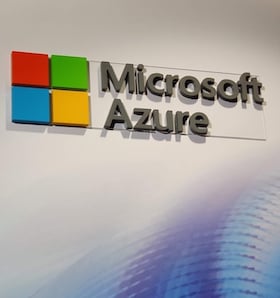If you want to be competitive as a company nowadays, you have to ensure that all your processes run optimally. Of course, that's where IT comes into play. And tif we're talking about IT, you can no longer ignore the (public) cloud. All major public cloud providers (Microsoft Azure, AWS, Google Cloud, etc.) provide you with a wealth of services and solutions for an even wider range of technical problems. But can you still see the forest for the trees? How do you keep up and make the right choices? Is a partner who offers to manage everything for you - a managed cloud service provider - the solution?
When you choose to migrate to the cloud, you actually have two options: you can choose to purchase your cloud services directly from Microsoft, Amazon or Google and manage them yourself, or you can choose to work with a managed cloud service provider.
 DIY: do it yourself
DIY: do it yourself Managed Cloud Services
Managed Cloud ServicesWhen we talk about managed cloud services, people often have the classic managed services model in mind: I outsource my entire IT infrastructure to a partner who then manages it for me.
In this classic model, managed services are very often placed on top of an existing environment and an attempt is made to monitor and manage that existing environment as well as possible.Perhaps the biggest difference lies in the fact that these managed cloud services have been specifically developed for the public cloud. In our case for Microsoft Azure, for example. Therefore, we can make optimal use of the possibilities and functionality that the platform offers us.
After all, managed cloud services are about more than just managing an environment. If you still have to migrate to the public cloud, we will review and plan in advance how we can optimize your environment for that public cloud. Governance plays a crucial role in this. But planning isn't the only part of cloud managed services, setting up the environment, managing it (that is still part of it, yes) and automating certain tasks and functions to work even more efficiently are in the scope as well.
A next generation cloud service provider no longer looks at infrastructure alone, but can also offer a lot of expertise in the field of applications and data. After all, these are interwoven in the public cloud in such a way that you only achieve optimal results if you have expertise in both these areas as well. Think of DevOps, but also other concepts such as application modernization, data modernization, artificial intelligence, etc.
Many providers opt for a classic model in which you as a customer pass on your wishes, requirements and problems to the provider's helpdesk, which then tries to deal with your questions and comments to the best of its ability.This provides a safe environment, but does make you lose control and speed. You can adjust little or nothing yourself without the help or approval of the provider.
In a modern version we in a model that combines control, flexibility, safety and speed through a controlled “Landing Zone”. Both you and our cloud engineers can get started right away. Of course, engineers from your provider will still monitor everything and intervene in case of problems. But you or your development team also have the opportunity to adjust or change things. In this way you can also grow as a customer and in the long term develop a Cloud Center of Excellence that you will then manage together with your cloud service provider or alone.
In short: you can choose to be in the driver's seat and take us as a passenger (read: trusted advisor) or you can turn the tables. We then take the lead and you can adjust things yourself (as a passenger) and learn from our expertise.
The aim of modern managed cloud services is to share knowledge and expertise. Before, during and after the migration. And of course also when managing your Azure environment. And when new Azure Services are rolled out. This way you stay up-to-date on the most important and relevant developments in Azure. The role of the managed cloud service provider t extends to knowledge sharing and training.
Next-Generation Managed Cloud Service Providers are strongly supported by the major cloud providers. After all, they benefit from the fact that users of their platform are supported by a party with expertise. And those providers can also offer a lot of extra services.
At Microsoft for example, you have the Cloud Solution Provider (CSP) program where you can not only buy various cloud services from a Managed Service Provider (MSP), but can also immediately take a set of managed services. In fact, if you still need on-premise licenses and / or software, your MSP can help you with that too, bringing it very close to a one-stop-shop experience. The advantage: all your costs are transparently covered by one provider.
And who doesn't love having to take just one party by the throat? 😉
 Cloud Custodian Services
Cloud Custodian ServicesAt Arxus, we invest heavily in this new approach to Managed Cloud Services. We therefore looked for a name that would best describe our new services.
The English word Custodian best fits the picture we have in mind. After all, it is synonymous with a number of words: guard, custodian, manager ... all tasks that we take on for you. Hence Cloud Custodian Services.
As an Azure Expert MSP, we can perfectly assume the role of Cloud Custodian and take care of the day-to-day management and monitoring of your entire Azure environment.
Our local certified Azure experts use the Microsoft Cloud Adoption Framework and Cloud Center of excellence (CCoE) model as a base for all their work.
 Free Azure Readiness Assessment
Free Azure Readiness AssessmentCurious? We are happy to get you started with our free Azure Readiness Assessment.
We assess your Azure Readiness and give you an idea of the possibilities, work points and risks during a migration to Azure.
Plan your own free Azure Readiness Assessment!
Is your IT infrastructure made up of different cloud platforms? Or do you still have some on-prem servers running? Then Azure Arc is the perfect tool for you! It allows you to manage your entire hybrid or multi-cloud environment in the blink of an eye, from one central location. Want to find out
Microsoft has announced that as of Sept. 30, 2025, they will no longer support default outbound connectivity for virtual machines (VMs) and scale sets. And that obviously has significant implications for users who currently (still) rely on it. Wondering why Microsoft made this decision? And what
Migrating to the cloud is a big step. Choosing the right platform? That's another issue altogether. For us, it's simple: we are thoroughly convinced of Microsoft Azure. Why? Because it has a tremendous amount of benefits for your business. Let's go over them together.